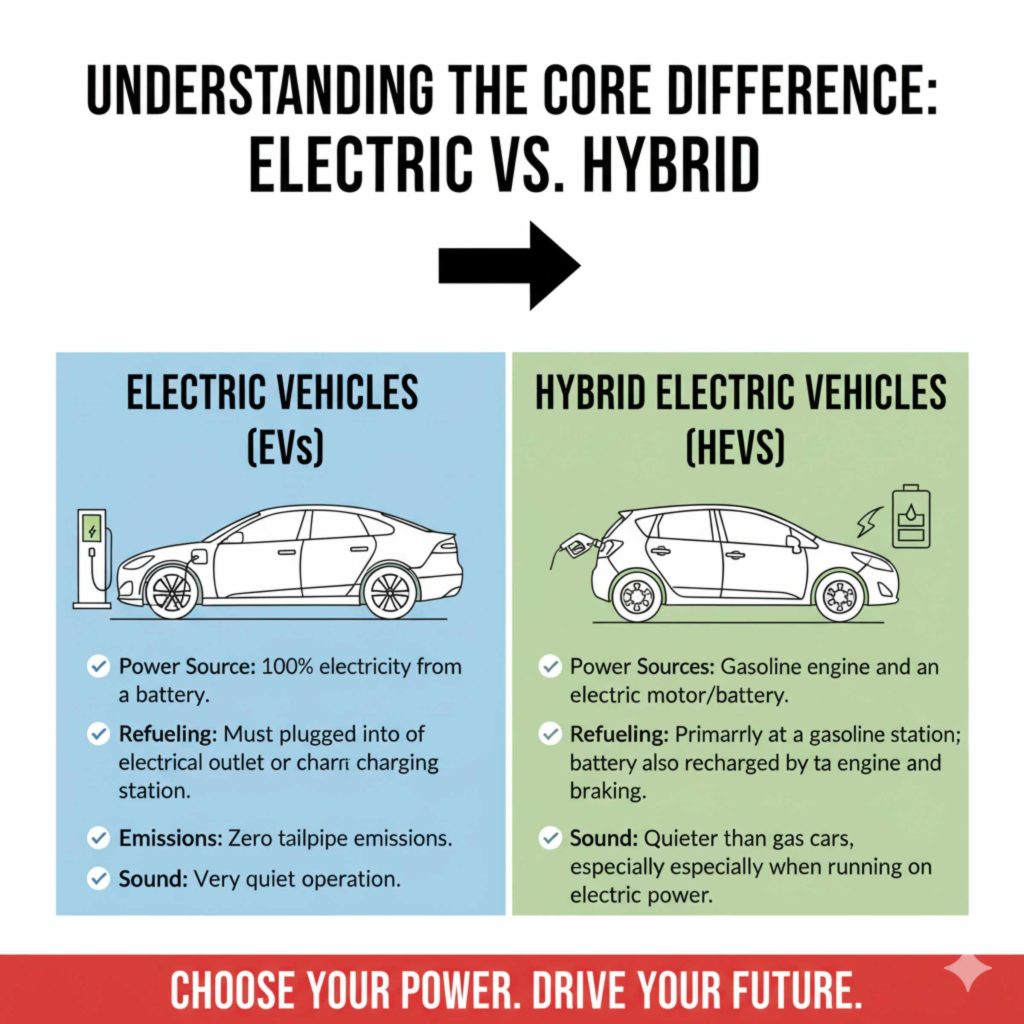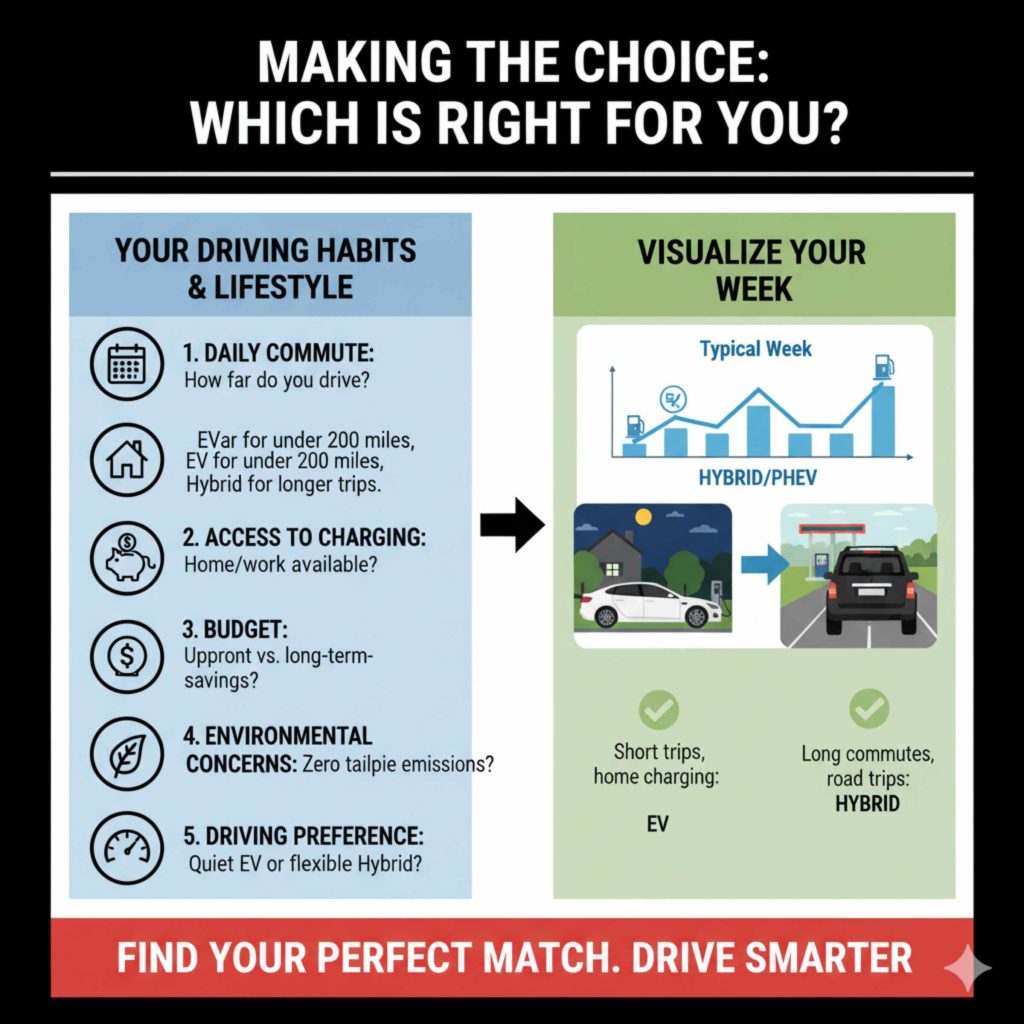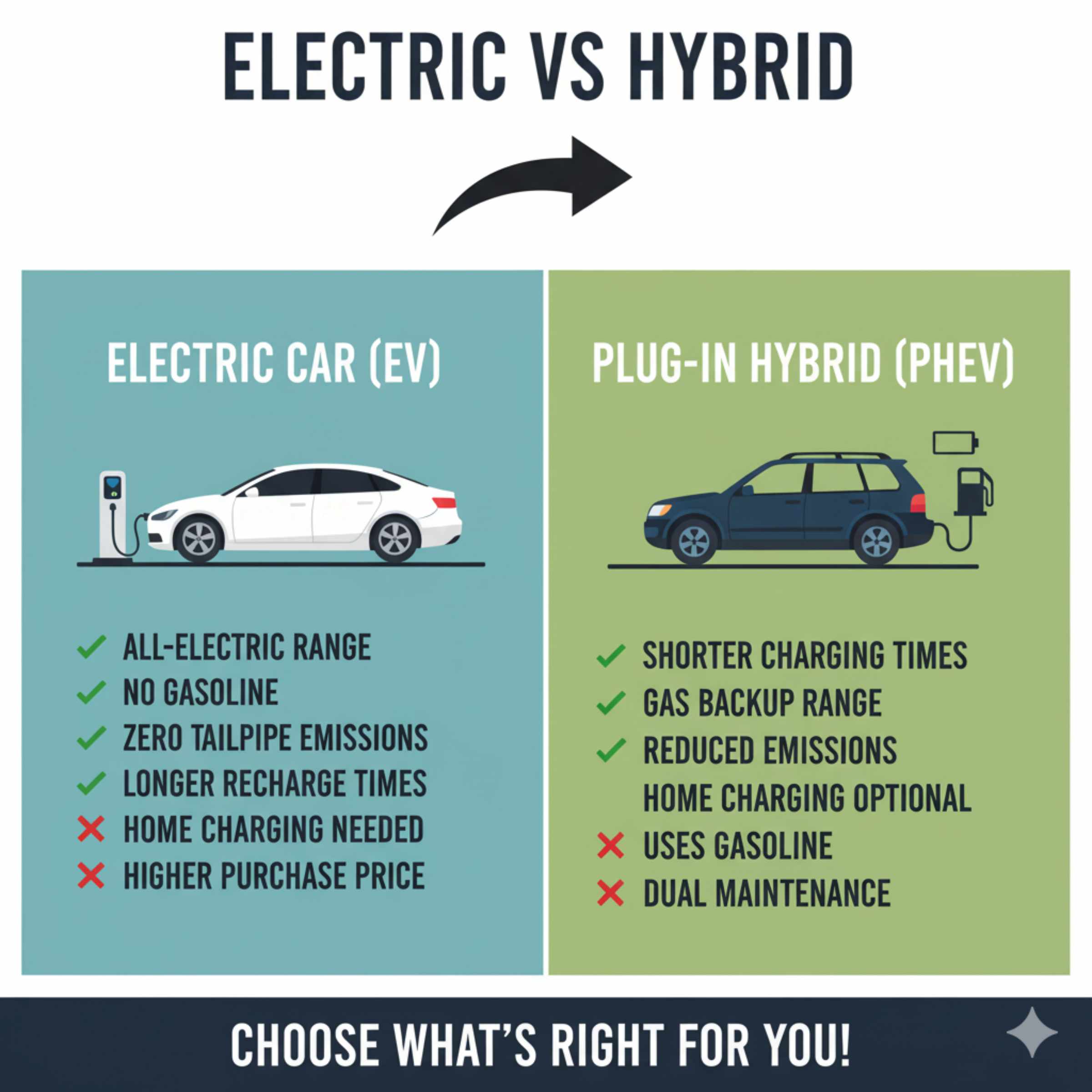Thinking about a new car? Electric (EVs) run purely on battery power, needing to be plugged in. Hybrids use both a gas engine and an electric motor, meaning they can refuel at a gas station and sometimes charge their battery while driving. You’ll save on fuel with either, but how you “refuel” and their driving range are key differences.
Hey there, car folks! Dustin here. Are you feeling a little overwhelmed by all the talk about electric cars and hybrids? It’s totally normal! These new technologies can seem a bit confusing at first, especially when you just want to know what’s best for your daily drive or your wallet. You might be wondering, “What’s the real deal with these cars?” or “Will they even work for me?” We’re going to break it all down step-by-step, using simple terms so you can feel confident about understanding the differences. We’ll explore what makes them tick and how they can fit into your life. Get ready to get smart about your next ride!
Understanding the Core Difference: Electric vs. Hybrid
At its heart, the main difference between an electric vehicle (EV) and a hybrid electric vehicle (HEV) comes down to how they get their power and how they use it. Think of it like this: EVs are all-electric, all the time, while hybrids are a team effort between a gasoline engine and an electric motor.
Electric Vehicles (EVs): The All-Electric Journey
Electric cars, or EVs, are powered solely by electricity. They have a large battery pack that stores energy. When you press the accelerator, that stored energy powers an electric motor, which turns the wheels. There’s no gasoline engine, no exhaust pipe, and no tailpipe emissions. To keep going, you need to plug your EV into an electricity source, much like you charge your smartphone.
- Power Source: 100% electricity from a battery.
- Refueling: Must be plugged into an electrical outlet or charging station.
- Emissions: Zero tailpipe emissions.
- Sound: Very quiet operation.
Hybrid Electric Vehicles (HEVs): The Best of Both Worlds
Hybrid cars combine two power sources: a traditional gasoline engine and an electric motor with a smaller battery. The car can use either power source, or sometimes both together, to move. This setup is smart: the electric motor can help the gasoline engine during acceleration, saving fuel. When you’re cruising, the gasoline engine can power the car and also recharge the battery. Some hybrids can even run on electric power alone for short distances, but they still need gasoline. You fill them up at a gas station. For more on how hybrids work, check out this great explanation from the U.S. Department of Energy.
- Power Sources: Gasoline engine and an electric motor/battery.
- Refueling: Primarily at a gasoline station; battery is also recharged by the engine and braking.
- Emissions: Reduced tailpipe emissions compared to traditional gas cars.
- Sound: Quieter than gas cars, especially when running on electric power.

Key Differences at a Glance
To make it super clear, let’s look at the main ways these two types of vehicles differ. This will help you see which might be a better fit for your lifestyle and driving needs.
| Feature | Electric Vehicle (EV) | Hybrid Electric Vehicle (HEV) |
|---|---|---|
| Primary Power | Electricity (Battery) | Gasoline & Electricity (Engine & Motor) |
| “Refueling” Method | Plug-in Charging | Gas Station (and self-charging battery) |
| Range on Full “Tank” | 40-500+ miles (battery charge) | 300-600+ miles (gas tank + battery assist) |
| Environmental Impact | Zero tailpipe emissions | Reduced tailpipe emissions |
| Complexity | Simpler powertrain (fewer moving parts) | More complex (gas engine + electric motor system) |
| Noise Level | Extremely quiet | Quieter than gas cars, engine can still be heard |
| Maintenance | Generally lower (no oil changes, fewer parts) | Similar to gas cars, but may have specialized hybrid components. |
Electric Vehicles (EVs) Explained: Pros and Cons
EVs are exciting because they offer a completely different way to drive. They’re often seen as the future of transportation, and for good reason. Let’s dive into what makes them great and what you need to consider.
Pros of Electric Vehicles
- Lower Running Costs: Electricity is often cheaper per mile than gasoline. Plus, many governments offer tax credits or rebates for buying an EV, making them more affordable upfront. Staying updated on federal tax credits for new EVs can save you money.
- Reduced Emissions: Driving an EV means you produce zero tailpipe emissions. This is fantastic for air quality in your local area and helps reduce your carbon footprint overall.
- Quieter and Smoother Ride: Electric motors are incredibly quiet and provide instant torque, meaning quick acceleration. The driving experience is typically very smooth and refined.
- Less Maintenance: EVs have far fewer moving parts than gasoline cars. No oil changes, no spark plugs, no exhaust system to worry about. This can lead to lower maintenance bills over time.
- Home Charging Convenience: You can simply plug in your EV overnight at home and wake up to a “full tank” every morning.
Cons of Electric Vehicles
- Higher Upfront Cost: EVs often have a higher sticker price than comparable gasoline or hybrid cars, although prices are coming down.
- Range Anxiety: This is the fear of running out of battery charge before reaching a charging station. While EV ranges are improving dramatically, it’s still something many drivers consider.
- Charging Time: While home charging is convenient, it can take several hours. Public fast chargers are quicker (20-60 minutes for a significant charge), but they aren’t as common as gas stations yet.
- Charging Infrastructure: Public charging stations are becoming more widespread, but they’re not available everywhere, especially in rural areas.
- Battery Life and Replacement: EV batteries degrade over time and eventually will need replacement, which can be expensive. However, most EV batteries come with long warranties (often 8 years or 100,000 miles).
Hybrid Electric Vehicles (HEVs) Explained: Pros and Cons
Hybrids offer a way to get better fuel economy without completely changing your driving habits. They bridge the gap between traditional cars and full EVs. Let’s look at what makes them a popular choice.
Pros of Hybrid Electric Vehicles
- Improved Fuel Efficiency: Hybrids use significantly less gasoline than similar gasoline-only cars, especially in city driving where the electric motor is used more often.
- No Range Anxiety: You can still fill up at any gas station, just like a conventional car. There’s no need to worry about finding a charger when your battery runs low.
- Lower Emissions Than Gas Cars: While not zero-emission like an EV, hybrids emit less CO2 and other pollutants than traditional internal combustion engine vehicles.
- Smooth and Quiet Operation: When running on electric power, hybrids are quiet. The transition between electric and gasoline power is also becoming very smooth in modern hybrids.
- Familiar Refueling: You don’t need to change your routine much. Just visit your usual gas station.
Cons of Hybrid Electric Vehicles
- More Complex Powertrain: Having both a gas engine and an electric system means more components that could potentially need maintenance or repair, though they are generally reliable.
- Higher Upfront Cost Than Gas Cars: Hybrids typically cost more than their gasoline-only counterparts, though the fuel savings can offset this over time.
- Battery Replacement Cost: Like EVs, hybrid batteries will eventually degrade and may need replacement, though their smaller size can sometimes make them less costly than EV batteries.
- Still Produce Emissions: Unlike EVs, hybrids still burn gasoline and produce tailpipe emissions.
- Less “Green” Than EVs: For those prioritizing the absolute lowest environmental impact, hybrids are a step up from gas cars but not as impactful as fully electric vehicles.
Are You a Plug-in Hybrid (PHEV) Person?
Before we move on, it’s worth mentioning a special kind of hybrid: the Plug-in Hybrid Electric Vehicle, or PHEV. PHEVs are a bit of a hybrid between EVs and standard HEVs.
What makes a PHEV different?
- Larger Battery: They have a bigger battery than a regular hybrid, allowing them to travel a significant distance (often 20-50 miles) on electric power alone.
- Plug-in Capability: You can plug a PHEV into an outlet to charge its battery, just like an EV.
- Gasoline Backup: When the battery is depleted, or if you need more range, the gasoline engine kicks in, and it operates like a standard hybrid.
Why choose a PHEV?
- It offers the best of both worlds for many: short daily commutes can be done on pure electric power (if you charge regularly), while longer trips don’t involve range anxiety because you have the gas engine.
- You can gradually adopt electric driving habits without a full commitment to charging infrastructure.
PHEVs are a fantastic option for people who want to reduce their fuel use and emissions but aren’t ready for a full EV. Learning more about Plug-in Hybrid Electric Vehicles from the EPA can give you a deeper understanding.
Making the Choice: Which is Right For You?
Deciding between an EV and a hybrid isn’t about which one is “better” overall, but which one is “better” for you. Consider these questions:
- Your Daily Commute: How far do you typically drive each day? If it’s under 200 miles, an EV’s range might be sufficient. If you often drive much further or have unpredictable long trips, a hybrid might offer more flexibility.
- Access to Charging: Do you have a place to charge at home (like a garage or driveway)? Can you easily charge at work? If not, relying solely on public charging for an EV can be challenging.
- Your Budget: What’s your upfront budget, and how important are long-term fuel savings? EVs can have lower running costs but a higher initial price. Hybrids strike a balance.
- Environmental Concerns: How important is zero tailpipe emissions to you? If you want the most eco-friendly option, an EV is the leader.
- Driving Habits: Do you prefer the quiet, smooth, and instant-acceleration feel of an electric motor, or do you prefer the familiarity and flexibility of a gasoline engine?
Think about a typical week. If most of your driving is short trips within 50 miles, and you can charge at home, an EV could be perfect. If you have longer commutes, frequently take road trips, or live in an area with fewer charging options, a hybrid or PHEV might be a more practical choice.

FAQs: Your Quick Questions Answered
What is the main difference between an electric car and a hybrid car?
An electric car (EV) runs solely on electricity stored in a battery, requiring plug-in charging. A hybrid car uses both a gasoline engine and an electric motor, refuelling with gasoline and recharging its battery through driving and braking.
Do hybrid cars need to be plugged in?
Standard hybrid cars (HEVs) do not need to be plugged in. Their batteries are recharged automatically by the gasoline engine and by capturing energy when you brake. Plug-in hybrids (PHEVs) are different and can be plugged in to recharge their larger batteries.
Which type of car is cheaper to run: electric or hybrid?
Generally, electric cars are cheaper to run per mile because electricity is usually less expensive than gasoline, and EVs have fewer maintenance needs. However, hybrids also offer significant fuel savings over conventional gas cars.
Which car is better for the environment: electric or hybrid?
Electric cars produce zero tailpipe emissions, making them the more environmentally friendly option for local air quality and overall carbon footprint. Hybrids are better than traditional gas cars but still produce emissions from their gasoline engines.
What is “range anxiety”?
Range anxiety is the fear that an electric vehicle (EV) doesn’t have enough charge to reach its destination or a charging station. While EV ranges and charging infrastructure are improving, it’s a common concern for potential EV buyers.
How much maintenance do EVs and hybrids require?
EVs typically require less maintenance than hybrids because they have fewer moving parts (no oil changes, no exhaust systems). Hybrids have similar maintenance needs to gas cars, plus potential maintenance for their electric components.
Are EVs and hybrids more expensive to buy than regular gas cars?
Yes, both EVs and hybrids often have a higher purchase price than comparable conventional gasoline cars. However, government incentives, lower fuel costs, and reduced maintenance can make them more affordable over their lifespan.
The Road Ahead: Embracing Cleaner Driving
The world of vehicles is changing, and electric and hybrid options are leading the charge towards a cleaner, more efficient future. Whether you choose a pure electric vehicle for zero emissions and low running costs, or a hybrid for its blend of fuel efficiency and familiar refuelling, you’re making a smart choice for the environment and likely for your wallet too.
Don’t let the technology seem intimidating. By understanding the basic differences in how they’re powered, how you “refuel” them, and their unique benefits and considerations, you can confidently pick the vehicle that best suits your lifestyle. Both EVs and hybrids offer fantastic ways to save money on fuel and reduce your impact on the planet, making them exciting options for any driver looking to upgrade.

